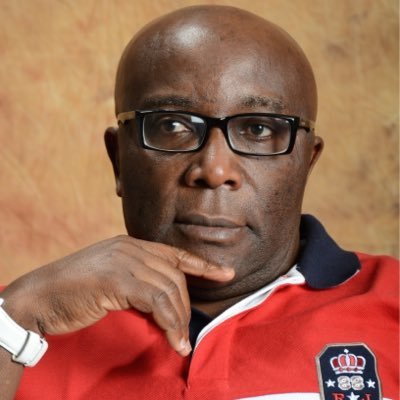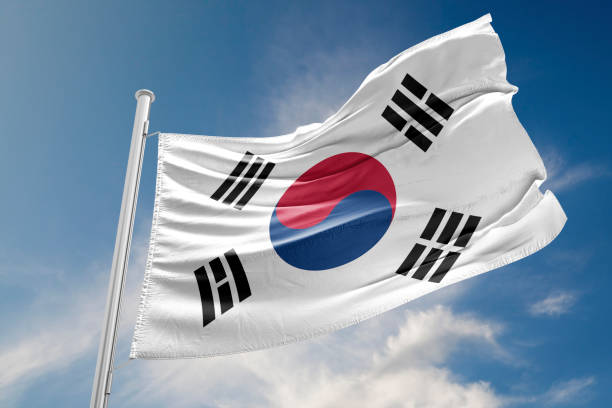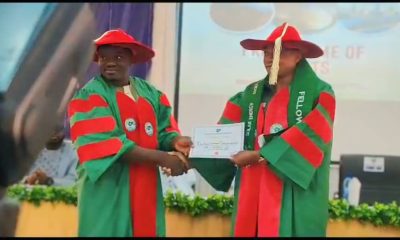Foreign News
From Libreville, An Ugly Postcard

By Chidi Amuta
The immediate past president of Gabon, Mr. Ali Bongo Ondimbo, has joined the new crop of video -posting toppled rulers.
The luxurious expanse of his gold plated presidential mansion in Libreville has shrunk into a tiny sitting space surrounded by book shelves and inconsequential furniture. From here, he has posted an online video that casually urged the world to ‘make some noise’ to draw attention to his altered circumstances. He of course pretends to be unaware of what is happening around him as he admits he is confined to a room while the whereabouts of his wife and family are yet uncertain.https://googleads.g.doubleclick.net/pagead/ads?client=ca-pub-6709758369371331&output=html&h=280&slotname=2123119829&adk=465047999&adf=2676246547&pi=t.ma~as.2123119829&w=644&fwrn=4&fwrnh=100&lmt=1693736032&rafmt=1&format=644×280&url=https%3A%2F%2Fwww.nationalaccordnewspaper.com%2Ffrom-libreville-an-ugly-postcard-by-chidi-amuta%2F&host=ca-host-pub-2644536267352236&fwr=0&fwrattr=true&rpe=1&resp_fmts=3&wgl=1&uach=WyJtYWNPUyIsIjEwLjEyLjYiLCJ4ODYiLCIiLCIxMDMuMC41MDYwLjEzNCIsW10sMCxudWxsLCI2NCIsW1siLk5vdC9BKUJyYW5kIiwiOTkuMC4wLjAiXSxbIkdvb2dsZSBDaHJvbWUiLCIxMDMuMC41MDYwLjEzNCJdLFsiQ2hyb21pdW0iLCIxMDMuMC41MDYwLjEzNCJdXSwwXQ..&dt=1693736032201&bpp=1&bdt=948&idt=404&shv=r20230830&mjsv=m202308290101&ptt=9&saldr=aa&abxe=1&cookie=ID%3Df5adffd583b64c9b-229526ea10d600fc%3AT%3D1666132495%3ART%3D1693736013%3AS%3DALNI_Ma693dnNsBzLrK_vRGO5C1xWYmQPA&gpic=UID%3D00000b12d62d6e07%3AT%3D1666132495%3ART%3D1693736013%3AS%3DALNI_Malo7GCYB-ozwNUzBx8cU6CU7j_2w&prev_fmts=0x0%2C644x280&nras=1&correlator=4018695916601&frm=20&pv=1&ga_vid=1995591903.1666132495&ga_sid=1693736032&ga_hid=1156506440&ga_fc=1&u_tz=60&u_his=6&u_h=800&u_w=1280&u_ah=739&u_aw=1280&u_cd=24&u_sd=1&dmc=4&adx=25&ady=1407&biw=1029&bih=659&scr_x=0&scr_y=0&eid=44759842%2C44759875%2C44759926%2C44796632%2C44801881&oid=2&pvsid=2968901827039517&tmod=829431005&uas=0&nvt=1&ref=https%3A%2F%2Fwww.nationalaccordnewspaper.com%2Fcategory%2Fopinion%2F&fc=1920&brdim=0%2C23%2C0%2C23%2C1280%2C23%2C1044%2C738%2C1044%2C659&vis=1&rsz=%7C%7CoEebr%7C&abl=CS&pfx=0&fu=128&bc=31&ifi=3&uci=a!3&btvi=1&fsb=1&xpc=sE2HGBXB0s&p=https%3A//www.nationalaccordnewspaper.com&dtd=411 https://googleads.g.doubleclick.net/pagead/ads?client=ca-pub-6709758369371331&output=html&h=280&slotname=2824164842&adk=1841859071&adf=1676647969&pi=t.ma~as.2824164842&w=644&fwrn=4&fwrnh=100&lmt=1693736032&rafmt=1&format=644×280&url=https%3A%2F%2Fwww.nationalaccordnewspaper.com%2Ffrom-libreville-an-ugly-postcard-by-chidi-amuta%2F&host=ca-host-pub-2644536267352236&fwr=0&fwrattr=true&rpe=1&resp_fmts=3&wgl=1&uach=WyJtYWNPUyIsIjEwLjEyLjYiLCJ4ODYiLCIiLCIxMDMuMC41MDYwLjEzNCIsW10sMCxudWxsLCI2NCIsW1siLk5vdC9BKUJyYW5kIiwiOTkuMC4wLjAiXSxbIkdvb2dsZSBDaHJvbWUiLCIxMDMuMC41MDYwLjEzNCJdLFsiQ2hyb21pdW0iLCIxMDMuMC41MDYwLjEzNCJdXSwwXQ..&dt=1693736032202&bpp=1&bdt=949&idt=441&shv=r20230830&mjsv=m202308290101&ptt=9&saldr=aa&abxe=1&cookie=ID%3Df5adffd583b64c9b-229526ea10d600fc%3AT%3D1666132495%3ART%3D1693736013%3AS%3DALNI_Ma693dnNsBzLrK_vRGO5C1xWYmQPA&gpic=UID%3D00000b12d62d6e07%3AT%3D1666132495%3ART%3D1693736013%3AS%3DALNI_Malo7GCYB-ozwNUzBx8cU6CU7j_2w&prev_fmts=0x0%2C644x280%2C644x280&nras=1&correlator=4018695916601&frm=20&pv=1&ga_vid=1995591903.1666132495&ga_sid=1693736032&ga_hid=1156506440&ga_fc=1&u_tz=60&u_his=6&u_h=800&u_w=1280&u_ah=739&u_aw=1280&u_cd=24&u_sd=1&dmc=4&adx=25&ady=1695&biw=1029&bih=659&scr_x=0&scr_y=0&eid=44759842%2C44759875%2C44759926%2C44796632%2C44801881&oid=2&pvsid=2968901827039517&tmod=829431005&uas=0&nvt=1&ref=https%3A%2F%2Fwww.nationalaccordnewspaper.com%2Fcategory%2Fopinion%2F&fc=1920&brdim=0%2C23%2C0%2C23%2C1280%2C23%2C1044%2C738%2C1044%2C659&vis=1&rsz=%7C%7CoEebr%7C&abl=CS&pfx=0&fu=128&bc=31&ifi=4&uci=a!4&btvi=2&fsb=1&xpc=PIXeAiBNBA&p=https%3A//www.nationalaccordnewspaper.com&dtd=452
In the last couple of months, some of the footages of Mr. Ali Bongo’s public appearances before the coup showed an infirm man recovering from a debilitating stroke but still firmly in power as the c heir to a family political dynasty that has presided over Gabon for the last 55 years. The younger Bongo is the son of former President, Omar Bongo who often wore high wedge shoes covered by a baggy James Brown -style ‘bongo’ trousers to enhance his dimunitive proportions.
In spite of his personal infirmity and the obviously dysfunctional state of Gabon, Mr. Bongo went ahead to prepare for last weekend’s presidential election. He predictably ‘won’ the election. Opposition parties and groups throughout Gabon however dismissed the election as a fraudulent sham. Mr. Bongo clung to his victory and power nonetheless but was quickly toppled in a palace military coup, barely four days after. The election would have given him a third term in an office he assumed in 2009. He had tweaked the constitution to give himself room for a third presidential term.
Soon after the election of last weekend, it was predictable that his party, the Gabonese Democratic Party (PDG) which he inherited from his late father would win. With a time tested combination of rigging, violence and official intimidation, the perpetual victory of the ruling party was fairly much guaranteed. But opposition forces had of late increased in strength and been joined by masses of disenchanted youth and the urban poor. Gabon, a nation of a little over 2.4 million people has the fourth highest GDP per head in sub Saharan Africa but lately wracked by unemployment and poverty.
Mounting political opposition led to a belated coalition of 16 opposition parties into an electoral alliance that presented a joint candidate to challenge Mr. Bongo at last weekend’s presidential election. That did not alter what was a foregone outcome in what has become a typical African sit -tight tradition of democratic persistence disguised as succession.
In continuation of a recent fashion among French speaking African countries, Gabon has fallen to the new coup contagion. The military struck barely four days after the election results were announced. In a televised photo opportunity that has become typical of the recent Franco-phone coups, a group of soldiers appeared on Gabonese national television to announce that they had decided to topple the democratic order ‘in the name of the Gabonese people’.
Predictably, they declared last weekend’s presidential elections as flawed, dubious and therefore annulled. Typically, the soldiers have suspended the constitution and all institutions of the state. They have also placed the ousted president under house arrest while taking in one of his sons on a charge of ‘high treason.’ As it turns out, the cop leader and transitional president is Brice Clotaire Oligui Nguema, commander of the presidential guards and a cousin of Ali Bongo.
The coup in Gabon comes barely two months after that in Niger which is still the centre of feverish activity within ECOWAS and the African Union. The Gabon coup merely increases the tally of a series of coups that have ravaged Franco-phone Africa. In quick succession, Sudan, Guinea, Mali, Burkina Faso, Chad, Niger and now Gabon have all literally fallen onto the sword. Previous coups in the countries under review have been advanced and marketed as the result of a series of identical causes ranging from insecurity caused by Sahelian jihadist terrorists to economic adversity and political misrule by leaders enthroned by democratic elections.
The Gabonese coup has pointedly indicated an open political dimension. The Gabonese military has added its voice to that of African opposition parties who have of late decried abuses in recent African democratic elections. The Gabonese coup makers have been clear and direct in joining their voice to that of opposition parties and groups. They have openly rejected the conduct and outcome of last weekend’s presidential election in Gabon as well as the long misrule under the Bongo dynasty.
Without doubt, all the coup makers in French -speaking West and Central Africa have acquired their audacity as a result of one single factor: the reduction and even outright decline in French presence and influence in the region. The disengagement of France from its former African coloniesis is the direct result of a latter day revolt by African countries against certain extant exploitative colonial era arrangements between France and its former African colonies. This arrangement which has gained recent currency defines an essentially exploitative economic relationship between France and its former African colonies.
According to the outlines of the arrangement, France has retained tight control over the international financial transactions of these former colonies as well as curtailed the autonomy of their central banks. This has made these countries subject to French supervision and ultimate financial authority. Therefore, the political storm at the bottom of these recent coups seems to be a general revolt of former African French colonies against the last vestiges of a colonial relationship that has left these countries politically independent but
Financially and economically dependent on Paris.
The progressive French disengagement from Africa has also removed the safety switch of ready French intervention and stabilization forces which used to be the guarantee against instability and wider insecurity in these countries. In the absence of standby French intervention and stabilization forces, the frail armies of these countries have taken to an easier recourse to coups to assert some authority.
The frenzy of coups in West and Central Africa will destabilize the region strategically in the near term. It may end up destabilizing not just the region but also upsetting an already stressed global order. The decline of French influence and military presence in the region exposes Western oriented countries in West and Central Africa to direct jihadist terrorist threat. More dangerously, West and Central Africa are now under the direct threat of recent Russian ambition and influence through the conspicuous presence and activities of the Wagner Group of mercenaries in the region.
For Africa, the recent spate of coups challenges our leaders to increase confidence in democracy by ensuring that the processes and practice of democracy meet the hopes of the people. But this is not just an African challenge. For the free world, there is a clear and urgent task of restoring confidence in democracy by using diplomatic pressure to roll back the specter of coups in Central and West Africa.
For the West, there is an immediate issue of defending a vital sphere of western influence from the ills of authoritarian rule and potential Russian influence. The ultimate question for the West is not merely diplomacy as usual. It is also an overarching moral burden. When and where does democracy deserve and qualify to be defended by its global champions? There must be a clear indication that global democracy has a guarantor that will stoutly defend it whenever and wherever it is under threat. Democracy is clearly under threat in Africa today. How the West responds will determine whether the forces of authoritarianism championed by China and Russia will prevail in the contest for a new world order or beat a retreat.
Foreign News
President Yoon Banned from Leaving South Korea

The South Korean Government ordered an overseas travel ban on President Yoon Suk Yeol.The South Korean news agency Yonhap reported on Monday that the travel ban is due to the ongoing investigation into Yoon, which involves suspicion of high treason.Yoon unexpectedly imposed martial law on his country last Tuesday night, but hours later, after massive political resistance, he repealed the order.
On Saturday evening, a motion by the opposition to impeach the president in parliament failed. However, public pressure against the 63-year-old continues. (dpa/NAN)Foreign News
Israel Threatens to Expand War if Hezbollah Truce Collapses

Israel threatened on Tuesday to return to war in Lebanon if its truce with Hezbollah collapses and said this time its attacks would go deeper and target the Lebanese state itself, after the deadliest day since the ceasefire was agreed last week.
In its strongest threat since the truce was agreed to end 14 months of war with Hezbollah, Israel said it would hold Lebanon responsible for failing to disarm militants who violated the truce.
“If we return to war we will act strongly, we will go deeper, and the most important thing they need to know: that there will be no longer be an exemption for the state of Lebanon,” Defence Minister Israel Katz said.
“If until now we separated the state of Lebanon from Hezbollah… it will no longer be (like this),” he said during a visit to the northern border area.
Despite last week’s truce, Israeli forces have continued strikes in southern Lebanon against what they say are Hezbollah fighters ignoring the agreement to halt attacks and withdraw beyond the Litani River, about 30 km (18 miles) from the frontier.
On Monday, Hezbollah shelled an Israeli military post, while Lebanese authorities said at least 12 people were killed in Israeli airstrikes on Lebanon.
Katz called the Hezbollah attack “the first test” and described Israel’s strikes as a strong response.
The Beirut government must “authorise the Lebanese army to enforce their part, to keep Hezbollah away beyond the Litani, and to dismantle all the infrastructure,” Katz said.
“If they don’t do it and this whole agreement collapses then the reality will be very clear.”
Top Lebanese officials urged Washington and Paris to press Israel to uphold the ceasefire, after dozens of military operations on Lebanese soil that Beirut has deemed violations, two senior Lebanese political sources told Reuters on Tuesday.
The sources said caretaker Prime Minister Najib Mikati and Speaker of Parliament Nabih Berri, a close Hezbollah ally who negotiated the deal on behalf of Lebanon, spoke to officials at the White House and French presidency late on Monday.
Mikati, quoted by the Lebanese news agency, said that diplomatic communications had intensified since Monday to stop Israeli violations of the ceasefire.
He also said a recruitment drive was under way by the Lebanese army to strengthen its presence in the south.
U.S. State Department spokesperson Matt Miller told reporters on Monday that the ceasefire “is holding” and that the U.S. had “anticipated that there might be violations”.
Neither the French presidency nor the foreign ministry were immediately available to comment.
French Foreign Minister Jean-Noel Barrot spoke to his Israeli counterpart Gideon Saar on Monday, saying both sides should adhere to the ceasefire.
The truce came into effect on Nov. 27 and prohibits Israel from conducting offensive military operations in Lebanon, while requiring Lebanon to prevent armed groups including Hezbollah from launching attacks on Israel.
It gives Israeli troops 60 days to withdraw from south Lebanon.
A mission chaired by the United States is tasked with monitoring, verifying, and helping enforce the truce, but it has yet to begin work.
Berri on Monday called on the mission to “urgently” ensure Israel halts its breaches, saying Beirut had logged at least 54 Israeli violations of the ceasefire so far.
Israel has said its continued activity in Lebanon is aimed at enforcing the ceasefire.
Lebanon’s Mikati met in Beirut on Monday with U.S. General Jasper Jeffers, who will chair the monitoring committee.
Two sources familiar with the matter told Reuters that France’s representative to the committee, General Guillaume Ponchin, would arrive in Beirut on Wednesday and that the committee would hold its first meeting on Thursday.
“There is an urgency to finalise the mechanism, otherwise it will be too late,” the source said, referring to Israel’s gradual intensification of strikes even with the truce in place. (Reuters/NAN)
Foreign News
Starmer Rules out Re-running UK Election as Petition Gets Signatures

British Prime Minister Keir Starmer has ruled out calling another general election, but said he is “not surprised” some people who did not support his party, Labour, might want a second poll.
A petition on Parliament’s website calling for another election has now been signed by more than two million people.
“I would like there to be another general election,” it reads.
“I believe the current Labour Government have gone back on the promises they laid out in the lead-up to the last election.
”Asked about the petition on ITV’s “This Morning” programme on Monday, Starmer said: “Look, I remind myself that very many people didn’t vote Labour at the last election.
“I’m not surprised that many of them want a re-run. That isn’t how our system works.
“There will be plenty of people who didn’t want us in the first place.
“So, what my focus is on is the decisions that I have to make every day.”
He characterized decisions taken so far by his government as “tough but fair.”
Starmer and his ministers have faced a particularly strong backlash for limiting winter fuel payments to only the poorest pensioners.
Farmers have also protested over changes to inheritance tax which they claim could affect the future of their businesses.
As he marks five months as prime minister, Starmer acknowledged the job has been difficult, but added: “I wouldn’t swap a single day in opposition for a day in power.
“It’s much better to be in power to do things, rather than the frustration, as I found it, in opposition for all of those long years where we were just able to say what we would do.”
The petition calling for another general election is open for signatures until May 2025.
While the vast majority of those signing it are from the UK, it has also gained support from other countries.
More than 1,200 people from the U.S. have added their names to it, with similar a number from France doing the same.
American signatories may have been made aware of the petition by Elon Musk, the businessman and ally of President-elect Donald Trump.
He shared the petition on X, the social media site he owns formerly known as Twitter, claiming “the people of Britain have had enough of a tyrannical police state”.
Starmer’s office sought to avoid being drawn into a war of words with Mr Musk.
The prime minister’s official spokesman added Starmer was “focused on the issues that matter most to the British people.”
Although it has garnered media attention and millions of signatures, it is far from the largest petition received through the Parliament website, or the one which has seen the most rapid take-up.
In 2019, some 6.1 million people signed a petition calling for the revocation of Article 50 and for the United Kingdom to remain in the European Union, four million of whom did so in 48 hours.
The second most-signed petition gained 4.1 million signatures.
The 2016 petition called for a second referendum on the UK’s membership of the European Union following the Brexit vote.
Because the election petition has received 10,000 signatures, ministers will issue a response to it.
MPs may consider it further in a Westminster Hall debate because it has been signed by more than 100,000 people, although this is not guaranteed.
A petition which has successfully made it to debate is one calling for social media companies to ban under 16-year-olds from their platforms after it received more than 110,00 signatures.
Another calling for the law around school term-time holidays to be relaxed, which received 250,000 signatures, was due for debate on Monday afternoon.
Michael Westwood, the man who started the petition, has confirmed he voted Conservative at the summer election.
But he told Talk TV he did not know if this would be the case again, adding: “One thing’s for certain, I wouldn’t be voting Labour.”
Among those sharing the petition online was retired actor Sir Michael Caine, who has been critical of Labour governments in the past. (PA Media/dpa/NAN)




















